Fish and chips, a simple dish consisting of deep-fried fish with a side of fried potato, is considered as the United Kingdom’s national meal. It is available in most English restaurants and can be served with various twists. But did you know this simple meal played a significant role for the English during the World Wars?
Fish and chips were served as a morale booster for British soldiers during the war as it was not rationed like other food supplies. It even became a sign for soldiers to know if the person approaching was friendly.
The History of Fish and Chips
Although it is always associated with English cuisine, fish and chips didn’t originate in the UK. It is believed that Jewish immigrants first introduced the idea of frying fish dipped in batter in the 17th century. Separately, the history of chips is said to have come from Belgium. Women resorted to cutting potatoes in the shape of a fish and frying it to feed their families in place of actual fish when the River Meuse froze during winter.
Though there has not been any proof discovered, the dish was already widespread by the 1800s. It is even mentioned in the 1838 novel Oliver Twist which Charles Dickens wrote.
Many food historians credit the young Jewish cook Joseph Malin as the first to introduce the dish to the public. He opened his shop in London in 1860. The shop was so successful that it remained in business until 1970. However, there were other claims that a businessman named John Lees was the first to open a fish and chips shop. By 1910, there were approximately 25,000 fish and chip shops in the UK. (Source: Forces)
The fish and chips shops were often small family businesses that served meals right in front of their homes. Still, eventually, the dish became a staple for the growing population during the industrial revolution. (Source: Historic UK)
The Role of Fish and Chips in the Wars
Fish and chips shops remained open during the first world war. It was seen as a morale booster in the UK by former Prime Minister David Lloyd George. To help improve the soldiers’ morale, George made sure that the dish was not part of the ration list, unlike bread, eggs, and meat.
Winston Churchill followed suit by taking off the dish from the ration list during the second world war. He famously referred to the alleged national dish as the good companions of the soldiers in the forefront of the war. (Source: Dockside)
Even though the dish was not on the ration list, it didn’t mean that supplies used to cook it were abundant. The British government safeguarded the supplies to ensure that the dish was not to be rationed.
There have also been stories wherein the famous dish was used during D-Day in the Normandy beaches. Allegedly, British soldiers storming the beaches would identify each other by yelling fish. They would then know that a fellow British soldier is near when they hear the response chips. (Source: Forces)
